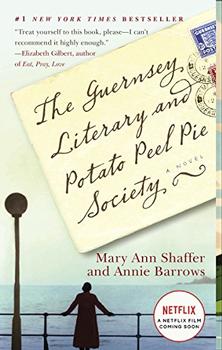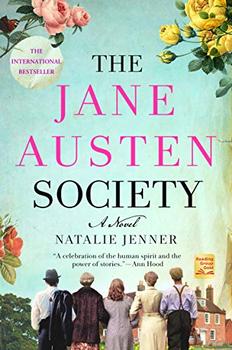Summary | Excerpt | Reading Guide | Reviews | Beyond the book | Read-Alikes | Genres & Themes | Author Bio

At first glance, readers may wonder how entertaining a book
consisting entirely of fictional correspondence could be - a
format that has been employed with mixed results by others.
Mary Ann Shaffer and Annie Barrows, however, are able to use
this style to great advantage in their novel, The
Guernsey Literary and Potato Peel Pie Society. The
result is a charming tale imbued with history, romance and
humor.
Comparisons between The Guernsey Literary and Potato Peel
Pie Society and the works of Jane Austen are inevitable.
Elizabeth Bennett pops into the reader's mind early in the
book, as the writings of the main character, Juliet Ashton,
display the same sort of sharp, irreverent wit as the
heroine of Pride and Prejudice. As with Austen's
works, the main strength of this novel is the authors'
ability to develop characters that readers genuinely come to
care for. Each of the islanders has a unique voice and
personality which is evident not only in their own
correspondence to Juliet, but in the gossipy letters the
neighbors compose about each other as well. There are a
couple of exceptions; a self-righteous neighbor and an
overly saintly missing member of the Society are
one-dimensional, but the rest of the characters are so
well-drawn that it's easy to forgive the occasional cursory
sketch.
The letters substitute for dialog, adding a sense of realism
to the islanders' first-person accounts. The incidents the
islanders relate regarding their experiences during the
German Occupation are engaging and, at times, quite
affecting. Unlike most historical fiction, events aren't
told in chronological order or in great depth; there's no
attempt here to convey a complete history. The readers are
instead presented with isolated, individual experiences.
It's a bit like listening to a grandparent relate his or her
wartime experiences. There's little context, but little is
needed.
Other pieces of correspondence reflect the warm relationship
Juliet has with her publisher and his sister, and the
growing bond between Juliet and the residents of Guernsey.
The authors also insert passages that provide readers with a
feel for what it was like to live in England after World War
II:
"Then Susan suggested a new dress. I reminded her that the Queen was very happy wearing her 1939 wardrobe, so why shouldn't I be? She said the Queen doesn't need to impress strangers – but I do. I felt like a traitor to crown and country; no decent woman has new clothes – but I forgot that the moment I saw myself in the mirror. My first new dress in four years… New shoes are going to have to wait, since I spent almost a year's worth of clothing coupons on the dress."
The epistolary format works well for this
book – most of the time. There are a few longer "letters" in
the book that detail the history of Guernsey that feel
forced and interruptive. These sections abandon the
conversational style prevalent in the rest of the novel,
instead reading as if they were copied verbatim from a
geography textbook. Fortunately, these passages are few and
occur early on in the novel.
Overall, this is a very pleasant novel sure to please those
looking for a lighter read. It's the perfect way to while
away an afternoon, and will leave its readers smiling.
First Impressions
Twenty BookBrowse members reviewed this book, with eighteen rating
it four or five on a five-point scale. Read their comments
here.
About the Authors
Mary Ann Shaffer was born in Martinsburg, West Virginia, in
1934. Her career included libraries, bookstores, and
publishing, but her life-long dream was to "write a book
that someone would like enough to publish." Though she did
not live to see it, this dream has been realized in The
Guernsey Literary and Potato Peel Pie Society.
She became interested in Guernsey while visiting London in
1976. On a whim, she decided to fly to Guernsey but became
stranded there when a thick fog descended and all boats and
planes were forbidden to leave the island. As she waited for
the fog to lift, warming herself by the heat of the
hand-dryer in the men's restroom, she read all the books in
the Guernsey airport bookstore, including Jersey under
the Jack-Boot. Thus began her fascination with the
German Occupation of the Channel Islands.
Many years later, when goaded by her book club to write a
novel, Mary Ann naturally thought of Guernsey. She chose to
write in the epistolary form because, "for some bizarre
reason, I thought it would be easier." Several years of work
yielded The Guernsey Literary and Potato Peel Pie
Society, which was greeted with avid enthusiasm, first
by her family, then by her writing group, and finally by
publishers around the world.
Sadly, Mary Ann's health began to decline shortly
thereafter, and she asked her niece, Annie Barrows (author
of the Ivy and Bean series for children, as well as
The Magic Half), to help her finish the book. Mary
Ann died in February 2008, knowing that her novel was to be
published in English and in translation in many languages
throughout the world.
Britain vs UK vs England
Have you ever been confused by the various different names
used to describe the soggy group of islands in the North
Atlantic? If so, here's a quick primer:
![]() This review was originally published in The BookBrowse Review in August 2008, and has been updated for the
May 2009 edition.
Click here to go to this issue.
This review was originally published in The BookBrowse Review in August 2008, and has been updated for the
May 2009 edition.
Click here to go to this issue.

If you liked The Guernsey Literary and Potato Peel Pie Society, try these:

by Natalie Jenner
Published 2021
Just after the Second World War, in the small English village of Chawton, an unusual but like-minded group of people band together to attempt something remarkable.

by Iona Grey
Published 2016
An accomplished novel from a talented writer, Letters to the Lost is a stunning, emotional love story.
We have to abandon the idea that schooling is something restricted to youth...
Click Here to find out who said this, as well as discovering other famous literary quotes!
Your guide toexceptional books
BookBrowse seeks out and recommends the best in contemporary fiction and nonfiction—books that not only engage and entertain but also deepen our understanding of ourselves and the world around us.